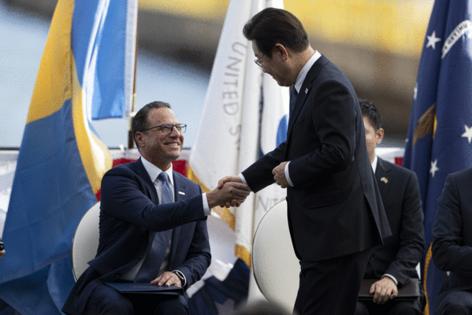Philly shipyard owner hires ex-Trump aide as it seeks clarity on immigration and investment
Published in Business News
PHILADELPHIA — Alex N. Wong, a former senior adviser on national security to President Donald Trump, will lead defense, shipbuilding, and aerospace strategy for Hanwha, a South Korea-based multinational industrial group that last month announced it would invest $5 billion to expand its Philadelphia shipyard as part of a larger commitment by Korean industries to modernize U.S. factories.
The move comes four weeks after Republic of Korea President Lee Jae Myung met with Trump and visited the South Philly shipyard to pledge extensive Korean investments. A week after that visit, U.S. Immigration and Customs Enforcement agents sparked outrage in South Korea by arresting hundreds of engineers and technicians helping to build a Hyundai and LG battery factory in Georgia.
That raid fed concerns of potential raids on Korean contractors in Philadelphia and other cities where Korean companies have committed to expand production. Lee said the arrests of skilled technical workers were “very confusing” and left Korean contractors wondering “whether they should go at all” to the United States. He urged the U.S. to “normalize” investment-related visa practices.
In hiring Wong as its global chief strategy officer, Hanwha stressed his ties to the U.S. military industrial establishment and its allies.
“With deep experience at the highest levels of international security and alliance building, Alex Wong will strengthen Hanwha’s engagement with our partners in the United States, Europe, and beyond, fostering deeper cooperation and delivering meaningful capabilities,” said Hanwha group vice chairman Dong Kwan Kim, whose grandfather founded the firm and whose father serves as chief executive.
“Hanwha is a vital company at such a pivotal time for the global defense and shipbuilding industries,” Wong said in a statement. As a manufacturer supplying naval and aerospace equipment, Hanwha intends to “bolster the security, prosperity, and industrial resilience of the United States, Europe, and countries across the world.”
After the Sept. 4 raid, Trump released a statement that acknowledged the need for foreign expertise: “When foreign companies who are building extremely complex products, machines, and various other ‘things’ come into the United States with massive investments, I want them to bring their people of expertise for a period of time to teach and train our people. For example, shipbuilding, where we used to build a ship a day, and now, we barely build a ship a year.”
The Hanwha Philly Shipyard, one of several commercial shipyards that makes vessels for the domestic Jones Act trade, builds a ship on average every eight months. Hanwha wants to increase that to more than 10 a year after adding a dry dock, cranes and other heavy equipment, and new buildings.
“I don’t want to frighten or disincentivize investment in America,” Trump said in the statement. “We will learn from them and do even better than them at their own game in the not-too-distant future!”
Investing in Philly
The Georgia arrests brought a strong negative reaction within South Korea and dismayed observers who have sought to marry Korean capital and industrial expertise to the Trump administration’s goal of revitalizing shipbuilding and other heavy industry as the U.S. competes with China.
“Hanwha’s vision is to accelerate the growth of a skilled American workforce for Philly Shipyard by bringing in world-class expertise from Korea,” the company said in a statement. “The U.S. visa system enables such workforce cooperation and training, and Hanwha is committed to full compliance with the U.S. immigration system.”
“We want new ships to be built in Philadelphia,” said David Oh, a former City Council member who now chairs the Asian American Business Alliance of Greater Philadelphia. “When you set up new technologies, you need people who have done them before to get them started. Everyone knows you can’t operate it without those specific technicians.”
Oh called the Georgia arrests “damaging” to an important partnership. “If it was a mistake, you expect someone’s head to roll.” But he also compared disruptive moves by the president to kuzushi, the judo concept of throwing others off balance to gain advantage.
“There are concerns about the investment in Philadelphia, given what happened in Georgia,” said Lauren Swartz, president and chief executive of the World Affairs Council of Philadelphia. “There are companies putting out warnings to their employees. That could cause a slowness” in plans to increase production.
“A lot of work is being done quietly to preserve the enthusiasm and Hanwha’s presence in Philadelphia,” Swartz added. “Consultations and a systematic approach with our partners in Korea, often is best.”
Swartz said the Trump administration’s immigration, trade, and investment policies appear not to have been closely coordinated.
“We saw this huge enthusiasm over hundreds of billions of dollars in Korean investment. Then the raid. Those ideas are in conflict,” she said. “Throw the tariffs in as well. We have to import a lot of steel and aluminum and machinery, and that is hitting communities and our economy in ways that I don’t think have been truly understood by the American people.”
Who is Alex Wong?
Wong served as principal deputy national security adviser in the second Trump administration from January to May. He left the security council along with his boss, national security adviser Mike Waltz, after Waltz said he accidentally included a magazine writer in council messages about bombing Yemen. Waltz was confirmed by the U.S. Senate last week as Trump’s ambassador to the United Nations.
In Washington last winter and spring, Wong’s job included coordinating policy on defense, international, and intelligence issues. He was chairman of the bipartisan U.S.-China Economic and Security Review Commission.
Wong previously worked in the State Department, serving as deputy special representative for North Korea and as deputy assistant secretary for East Asian and Pacific Affairs. He was a senior fellow at the Hudson Institute think tank.
_____
©2025 The Philadelphia Inquirer, LLC. Visit at inquirer.com. Distributed by Tribune Content Agency, LLC.












Comments